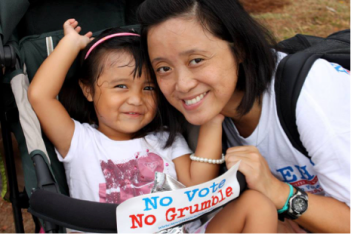As we are swept into this year’s political campaigns, it might be a good thing for us to pause and refocus our understanding of what our privileges and responsibilities are in the craziness of selecting our local, state, and national representatives and policy makers. I am fully committed to the slogan, “No Vote, No Grumble,” as our initial step into the political process. If we don’t work it, our representative system doesn’t work. It is as simple as that! I think we’ve seen some of the consequences of non-participation and it is not a pretty or encouraging sight for our communities. Sitting on our hands in the voting process will lead to public policies and practices we will find hard to live with.

Assuming we will be a part of the process, what are the initial steps we need to take to get informed and engaged? I have found it extremely helpful to put myself through a simple self- analysis regarding the three or four issues that light my public passion:
- Can I articulate each one of them in such a way as to show how it is connected to public policy?
- Do I understand present public policy and the areas that need attention?
- Can I align my perspectives of the issues with what seem to be the positions taken by politicians who represent me and then make informed judgements about whether their representation furthers the causes I find important?
It sounds complicated, but in reality it is a straightforward process of analysis that should be made possible with the resources available to the interested citizen. It is the effort on our part that is the missing element.
In our Foundation’s work in the shelters, we have found that even the most disadvantaged in our midst are interested in understanding how our system of government works. We have found that those who are “homeless” want to know how to access resources in the political process and are willing to use them when taught how to do it. It is clear that they understand the two or three issues of prime importance to them and their families, and they are anxious to understand how to influence public policy in those areas. Housing, health, food and employment stand out as clear interests in this demographic and though they may struggle to organize everyone together, they are slowing understanding the connection between the political process and change in their universe.
Prosperity often dulls our interest in change or our outrage at unfair policies. It is precisely this reality that should encourage us to seek to understand the issues and concern that can motivate us into action. Over the last twenty years, I have increasingly been motivated by a desire to see all our children have access to quality early education that prepares them for success in formal schooling.
This is particularly important to me as I view our community that has half of our 0-5 year olds from families who can’t afford or access preschool, and these keiki therefore enter kindergarten without preparation and are condemned to struggle to catch up with their peers. Many don’t catch up and meanwhile, our public school system is strained. It is my responsibility to translate this concern for early education into a guide for my political behavior. My vote needs to reflect my commitment to this important community issue.
It is obvious that issues often get blurred and intertwined with each other. Often we are faced with candidates who attract and repel us at the same time. The system continues, so we need to press for those who best (though imperfectly) reflect our vision of our community.
Finally, it is important that we follow up with those for whom we have cast our vote. Accountability is what gives our system of representation its teeth. “Grumble” is the right of those who have voted! Press for the goals you hold dear for our public policies and the system will begin to work! The political season has started and it is our privilege to put it to the test! Aloha!



